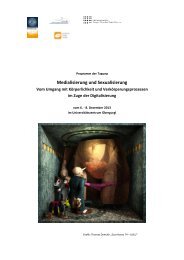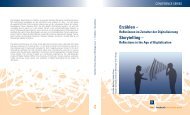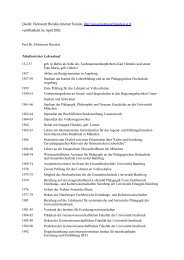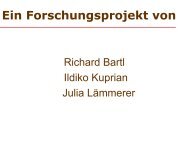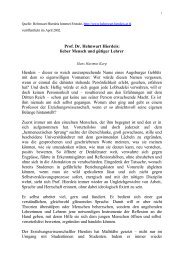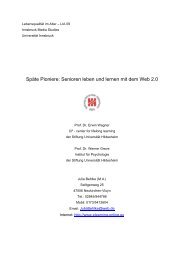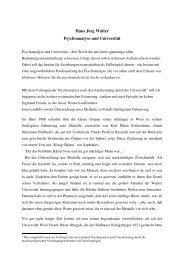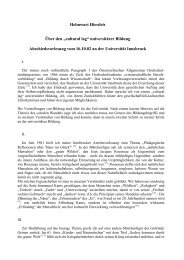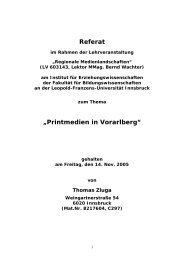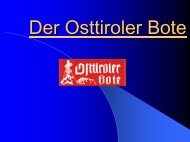Download pdf - Universität Innsbruck
Download pdf - Universität Innsbruck
Download pdf - Universität Innsbruck
Erfolgreiche ePaper selbst erstellen
Machen Sie aus Ihren PDF Publikationen ein blätterbares Flipbook mit unserer einzigartigen Google optimierten e-Paper Software.
‘Let the Source be with you!’ – Practices of Sharing in<br />
Free and Open-Source Communities<br />
Andrea Hemetsberger<br />
Abstract<br />
Free and Open-Source Software (F/OSS) Communities enjoy a long history of sharing. They<br />
share source code, knowledge, social approval, communal ties and a ‘hacker’ ethics of giving<br />
back and helping others. Empirical investigation into the F/OSS network exhibits five central<br />
practices of sharing: materializing intellectual capital (sharing code/economic capital), creating<br />
intellectual capital (knowledge sharing), seeding of culture (sharing social capital), relating and<br />
bonding (sharing symbolic capital), and signifying (sharing cultural capital). Through processes of<br />
sharing in, sharing out and sharing across core members, contributors, and the public, F/OSS<br />
communities circumvent the capitalist logic, and sustainably contribute to an open, global system<br />
of sharing common goods.<br />
Introduction<br />
Free and Open-Source Software (F/OSS) Communities enjoy a long history of sharing. In<br />
F/OSS projects organizational structures have emerged that enable a large number of volunteers<br />
to commit themselves to freely chosen work. John (2011) has recently coined the<br />
notion of ‘sharing communities of production’ for such communities, as compared to<br />
‘sharing communities of consumption’ – both upcoming and distinctive forms of sharing<br />
in the Web 2.0 and Web 3.0 era. Researchers have investigated how members of the opensource<br />
community use the networking effect in a technological as well as in a social sense<br />
for knowledge sharing (Tuomi, 2001; Lee & Cole, 2003; Morner & Lanzara, 2004;<br />
Lanzara & Morner, 2005). Other research has been concerned with integration processes<br />
of aspirant members, cooperation and coordination of contributors, gift-giving, and cooperation<br />
between companies and the open-source community (Lakhani & von Hippel, 2000;<br />
Bergquist & Ljundberg, 2001; von Krogh et al., 2003; Zeitlyn, 2003; Dahlander & Magnusson,<br />
2005). F/OSS projects are fascinating study objects for their distinct form of collaboration<br />
among people with quite diverse backgrounds as professional coders, students,<br />
enthusiast users and followers; for their passionate involvement, and for some amazingly<br />
sophisticated pieces of software, which they freely share.<br />
Researchers agree that F/OSS communities not only share source code but also knowledge,<br />
social approval, communal ties and a ‘hacker’ ethic of giving back and helping others<br />
(Himanen, 2001; Hemetsberger, and Pieters 2001a, 2006, 2007, 2008). Viewed from a<br />
Macro perspective, however, sharing has a much greater impact on F/OSS communities,<br />
as well as on society at large. Sharing source code turns into a valuable public good; sharing<br />
knowledge creates a global conglomerate of intellectual capital through various know-



